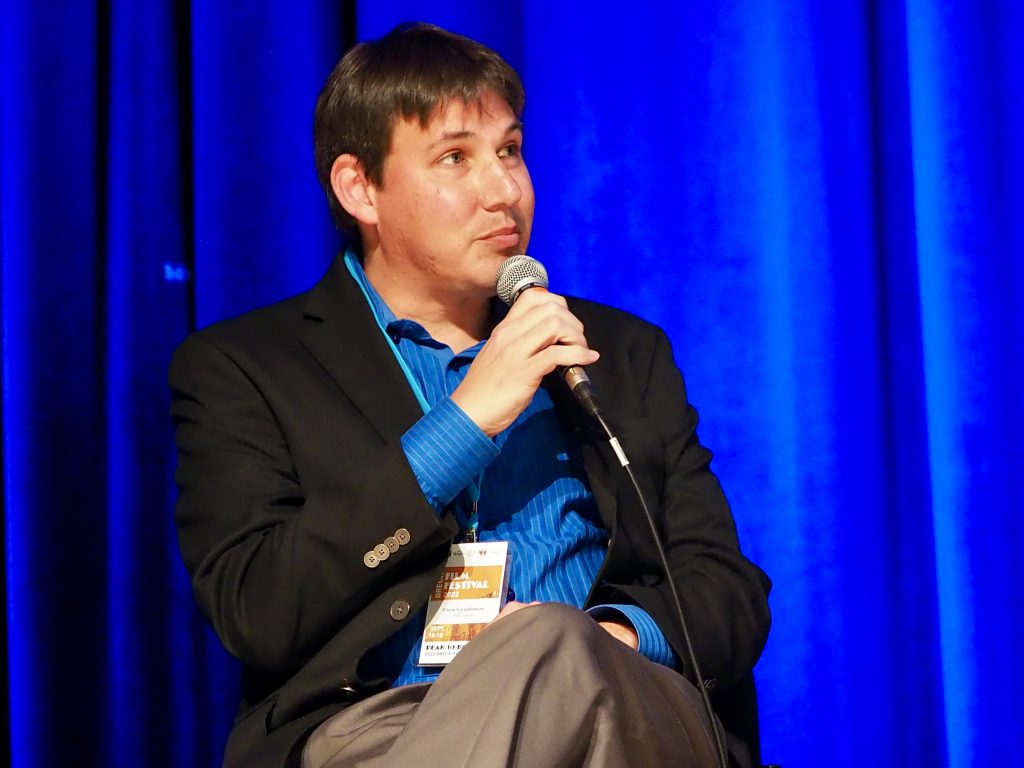
First gentleman Marlon Reis takes part in the Breck Film Festival panel on wild horses
First Gentleman Marlon Reis speaks during a panel at the Breck Film Festival on Sunday, September 18, 2022. The panel followed the screening of the documentary ‘Wild Beauty: Mustang Spirit of the West’, which focuses on roundups of horses throughout the West.
Elaine Collins/Breck Film
Governor Jared Polis and First Gentleman Marlon Reis traveled to Breckenridge on Sunday, September 18 to attend the world premiere of “Wild Beauty: Mustang Spirit of the West” at the Breck Film Festival.
The documentary, centered on roundups of wild horses across the American West, was partially filmed around the Sand Wash Basin horse collection, a region of Moffat County in the northwest corner of Colorado. Just over a year ago, 608 horses were rounded up by the Bureau of Land Management in the basin, leaving only 163 feral horses in the area.
Reis was a strong supporter of wild horses staying on public lands during roundups, and he said Sunday he has long believed that art can spark conversation or reach people in ways that traditional politics or Political conversations can’t.
“I noticed several times in the movie the reference to the observers (of the roundups) having to be brought together, and then people having to control their emotions,” Reis said. “It was in stark contrast (to) the detachment that is clearly required of people conducting these operations on behalf of the BLM. I said it from day one…since I had the good fortune to be the first gentleman here in Colorado to hold this position: once you commit an act of violence, the next time it’s is a little easier.
Reis also praised wild horse advocates in the West, who repeatedly reached out to the governor’s office during the Colorado roundups. He said that at the time, it was difficult to gather information about the roundup process from various entities, and this was often due to a lack of communication between the parties involved.
“What we are looking at right now is the development of a state-sponsored non-profit organization that would provide a steady source of state and volunteer organization personnel to assist volunteers, because c “It’s the perfect example of a situation where a federal agency — with the kind of budget BLM has — shouldn’t rely solely on volunteers to carry out its mission,” Reis said. I think it’s just bad governance. As we heard (in the movie), the number of wild horses losing their freedom (is increasing). We really need to focus on the fact that they have the freedom, but they don’t have it afterwards.
Ashley Avis, who directed the film, said that while the documentary is primarily about wild horses, it’s ultimately about protecting the great wild world on public lands.
“If you’re going out and you’re with your family and want to experience the American West, you probably don’t want to go camping and see the cattle grazing or see dozens of cattle in the forest instead of wild horses – au place of other beautiful natural animals,” she said. “So I think it’s all on the line. And this year we’re reaching a tipping point where there might already be more wild horses in the detention only free on public lands, which is only a travesty.
Avis said she hopes the public takes away that advocacy is what will keep wild horses on public lands. Western Watersheds Project executive director Erik Molvar, who featured in the film, said he believed the office should be reformed to protect wild horses and other living creatures on public lands.
“I think we need to flip that paradigm and get the Bureau of Land Management to start managing public lands for abundant and thriving natural ecosystems for abundant wildlife, and for public recreation and enjoyment,” Molvar said. .
“Wild Beauty: Mustang Spirit of the West” had its world premiere on Sunday, September 18 at the Breck Film Festival. Director Ashley Avis and others spoke with first gentleman Marlon Reis about defending wild horses after the screening.
Copyright © 2025. La Dama Y La Muerte. All Rights Reserved.